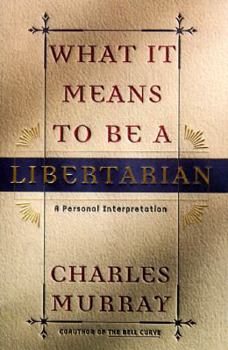What It Means to Be a Libertarian: A Personal Interpretation
Select Format
Select Condition 
Book Overview
Charles Murray believes that America's founders had it right--strict limits on the power of the central government and strict protection of the individual are the keys to a genuinely free society. In... This description may be from another edition of this product.
Format:Hardcover
Language:English
ISBN:0553069284
ISBN13:9780553069280
Release Date:December 1996
Publisher:Broadway Books
Length:178 Pages
Weight:0.70 lbs.
Dimensions:0.8" x 5.4" x 8.3"
Customer Reviews
3 ratings
An enchanting song I can't sing
Published by Thriftbooks.com User , 19 years ago
What is this strange thing called Libertarianism? I thought I had a pretty good idea, but I decided to investigate further after reading Candace Jackson's "Their Lives: The Women Targeted by the Clinton Machine," a book in which the author defined our former president's predilection for women against the larger themes of liberalism, conservatism, and libertarianism. I dithered about for a few months deciding which course I wanted to take before settling on Charles Murray's "What It Means to Be a Libertarian." I was familiar with the author from the brouhaha his book "The Bell Curve" kicked off roughly a decade ago, but knew little else about him. The name recognition, however, coupled with the knowledge that "What It Takes to Be a Libertarian" runs a scant 178 pages (at least in my hardback copy) convinced me that this was the place to start. The author will have to make his points quickly if he can fit everything into a book less than 200 pages in length, I thought to myself, and I was right. Murray's book is a model of to the point writing. What is this strange thing called Libertarianism? It's what I thought it was all along. Libertarians, as Murray points out very quickly, differ in their opinions on specific issues as much as members of other political persuasions. But it's possible to distill one core belief that all libertarians share: the individual's freedom is central to human existence. Society works best when the individual retains the right to make as many choices in their life as possible. The archenemy of individual freedom is local, state, and national governments and their handmaidens bureaucracy, regulation, and spurious laws. Government, according to Murray, does have some important functions. For example, ensuring basic liability protections for consumers and protecting the markets from natural monopolies are important government functions. Murray changes his tune when it comes to things like social welfare programs, anti-drug laws, housing programs, agricultural and energy regulations, education, and anti-discrimination laws. He wants all of these governmental functions, and quite a few others to boot, eliminated. The reader can practically hear the heads of liberals and conservatives exploding while reading the list of policies, laws, and regulations the author thinks should go the way of the dinosaur. Interestingly enough, Murray makes it all sound like common sense. He introduces a concept called the Trendline Test to prove how, time and time again, the government mucks up anything it tries to do beyond its basic functions. Remember the introduction of seatbelt laws? Remember how many lives they saved with the help of millions upon millions of tax dollars? According to Murray, a trend line shows that deaths due to car accidents began a serious decline thanks to safer cars and better technologies long before government decided to play superhero. Once the bureaucracy came into the picture, they made little difference. The
Here's a book that might make you think a little
Published by Thriftbooks.com User , 24 years ago
Charles Murray has his own views of what the perfect Libertarian world would be. He isn't asking that the federal government privatize roads, or eliminate the EPA, but he would like to see them do their constitutional duties first and leave other tasks for the market place. His premise is that we should judge government actions not by intentions, but by outcome. He makes a good case that New Deal and Great Society programs have been around long enough to quantify the benefits, but the numbers indicate no improvement. Also, Murray contends the government has been neglecting their real duties such as national defense and foreign policy to look after the welfare state.Murray discusses education, the environment, drug policy, discrimination, economics, and responsibility from a fresh point of view. If you are tired of the same old ideas on the evening news, read this book.
An Elegant Vision
Published by Thriftbooks.com User , 24 years ago
As an introduction to libertarianism, Charles Murray's "What It Means to Be a Libertarian" is often compared to David Boaz's "Libertarianism: A Primer" which also came out in 1997. They are both excellent, but completely different in style and approach. Murray's book is shorter (roughly half the length), more theoretical and philosophical, and calm in tone. He conveys an elegant vision for how society ought to function, and argues convincingly why this is realistic rather than utopian. Liberals and conservatives should both agree with his vision of how things _ought_ to be, though they may remain unconvinced of the feasibility: sometimes relying on the invisible hand that guides the economy is as difficult as trusting the invisible hand that holds up an airplane. This is an elegantly written and extremely readable book, and an excellent introduction to what libertarians are _for_ as well as what they are against.





